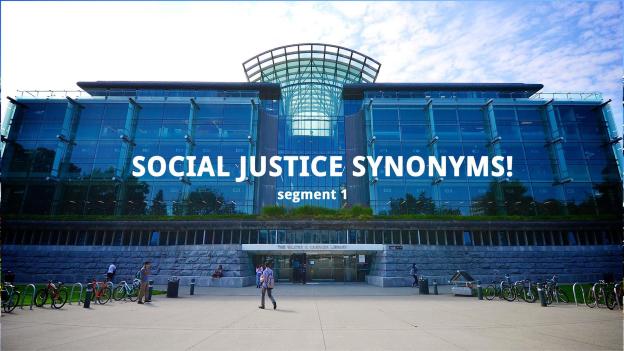Welcome to Social Justice Synonyms! This will be a regular piece that highlights not-so-cool words, explains the reasons why they are problematic, and provides some alternatives.
Here at The Talon, we firmly believe in the importance of anti-oppressive politics. As such, we would like to ensure that our language reflects these values.
Language is a powerful tool. Problematic language pervades everyday speech, households, workplaces, institutions, and minds. Lydia Brown, autistic disability rights activist, writes that language is inherently political; it is a vessel through which dominant groups wield power and authority to maintain the status quo. When folks use oppressive language, they are not only harming individuals, but also contributing to histories of marginalization. It is therefore important to collectively interrupt the way in which oppression operates through language. Although critiquing problematic language will not necessarily ‘change the world,’ it is a key factor in helping us make our spaces safer and less triggering.
Some people may say that they “didn’t intend to be oppressive” or that they “were just being ironic and funny.” However, the clearest of intentions doesn’t change the fact that language is still being used at the expense of certain communities. When folks say “can’t you just take a joke?”, they reify an oppressive framework in which marginalized groups must be the punchline for dominant groups. In many cases, this can be traumatic and emotionally-harming for the marginalized community and individual in question. As tumblr user tooyoungforthelivingdead writes, “marginalized people often do not have the luxury of emotionally distancing themselves from discussions on their rights and experiences.”
Other people may feel that we are being “too sensitive” or “too politically correct”. But this stuff matters! Dismissing others for “being too PC” (politically correct) employs another form of silencing, adding to historical and ongoing experiences of suppression and repression. Being “PC” isn’t about policing language or stifling free speech – it’s about, at the very least, being thoughtful and intentional with our language.
Finally, we want to note that oppressed groups often reclaim words that have been historically used against them – ie. people with disabilities self-identifying with ‘crip’, Black communities using the ‘N-word’, LGBTQIA2S+ people identifying as ‘queer’. We want to stress that only members of marginalized groups can reclaim terms that have been used to oppress them. This is because it is the marginalized community’s way of taking back power – through reclaiming a slur, changing its meaning, and using it in the spirit of resistance. Notably, however, marginalized groups are not homogenous, and folks within these communities have diverse opinions on reclamation. It is important to acknowledge the fluidity of language and the ways in which it can affect power relations between communities and individuals, depending on different historical and personal contexts. Language can be used, abused, reclaimed, forgotten, molded, and transformed.
So here’s to making our language less oppressive, one word and one week at a time!
Also – check out some resources here, here, and here.
This week’s word is crazy.
(No way, crazy? Yeah. But actually. Yes.)
Crazy is a word that is deeply embedded in our society. We hear it on the radio, in academic scholarship, on TV, in our own language. It is everywhere. Crazy has now become synonymous with words like foolish, silly, unruly, outrageous, laughable, and stupid. When used in this manner, crazy is an ableist term that dismisses the experiences of folks with mental health issues and disabilities. Using crazy implies that unsuppressed emotionality is undesirable. It belittles the experience of mental health and disability as irrational, disagreeable, and over-the-top. Words such as psycho, nuts/nutso, insane, loony, lunatic, madman, mental, unhinged, and bananas have the same connotations. RMJ, a guest poster on disabledfeminists.com, writes
Whether [crazy] means “bad” or “evil” or “outlandish” or “illogical” or “unthinkable”, it’s turning the condition of having a disability into an all-purpose negative descriptor. When using crazy as a synonym for violent, disturbing, or wrong, it’s saying that PWMD (person’s with mental disablities) are violent, disturbing, wrong. It’s using disability as a rhetorical weapon.
http://disabledfeminists.com/2010/05/17/guest-post-from-rmj-ableist-word-profile-crazy/
Let’s check ourselves before we wreck ourselves. As difficult as it may seem to remove crazy from our speech, it’s super possible! Outlined below are a few different contexts in which crazy is commonly used, with some some replacement suggestions in the right column.
| Use/context | Alternatives |
| “That party was crazy!” | Wild, ridiculous, senseless, extraordinary, exciting, exhilarating, amazing, wacky, zany, outlandish, over the top |
| “The man on the bus is crazy.” | Peculiar, weird, odd, different, strange, eccentric, unconventional, offbeat |
| “My teacher is such a crazy asshole.” | Unfair, unforgiving, senseless, silly, ludicrous, asinine, misleading, overly critical, stern, disagreeable |
| “My ex* was so crazy.” | Emotional, upset, reactive, sensitive *Crazy is especially problematic when it is used in a gendered context, as women have historically been dismissed as “overly emotional” – and therefore hysterical and irrational. The terms “crazy ex-girlfriend” or “crazy bitch” are harmful and hurtful because they silence, decontextualize, and minimize someone’s experiences. For further reading, click here and here. |
Thanks for dropping by, wordsmiths. See you next time!
If you have any word suggestions for future weeks, feel free to contact us at talonubc@gmail.com with the headline: Suggestion for Social Justice Synonyms. Looking forward to hearing from you!
Big-time acknowledgments and gratitude to the folks at autistichoya.com and disabledfeminists.com, and the anonymous contributors of Anti-Oppressive Alternatives for providing examples and suggestions.




